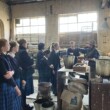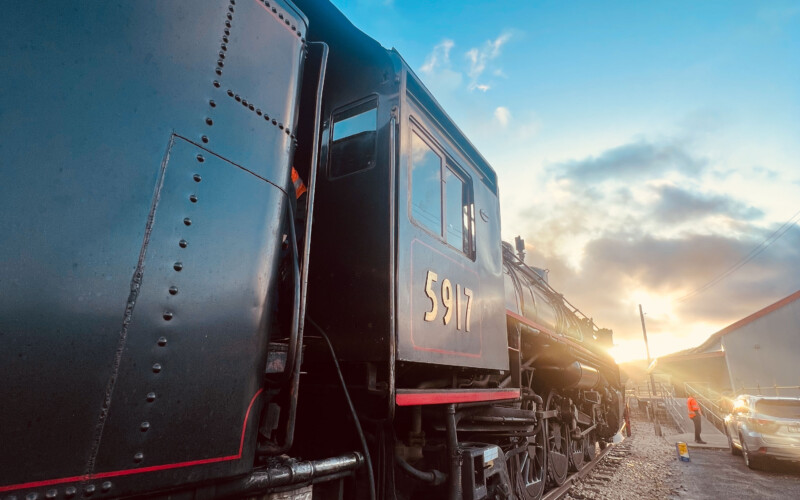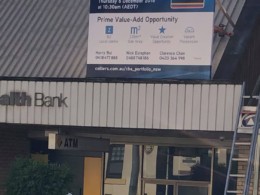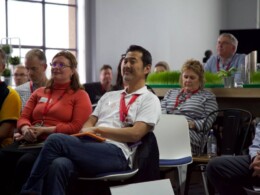Call for Lithgow Locomotive Workshop to be brought back into public hands
It’s been underutilised for over 15 and unoccupied for 5 years, takes up a quarter of Lithgow’s industrial land area and used to employ hundreds of people from the local workforce. The Lithgow Locomotive Workshop was once a vibrant workplace. It’s currently being used to house the new InterCity trains before they go into service in December. After that, locals want it brought back into active use so it can start employing hundreds of people again.
Local group, Lithgow Community Power Project have launched a public campaign to bring the Lithgow Locomotive Workshop back into public ownership.
‘If it’s in public ownership, it can be leased out to private sector industries that have commercially viable uses for the site,’ said Mr David Peters, Chairman of the Lithgow Community Power Project. ‘That way it won’t be left vacant and can provide ongoing employment for local trade and engineering professionals and opportunities for local apprenticeships.’
The Workshop was ceded to Pacific National in 2003 when the NSW Government fully privatised its’ rail freight services. At the same time, it also opened the rail network up to competition between private rail freight operators.
‘Realistically, the fortunes of private sector companies rise and fall,’ said Mr Peters. ‘While it might make sense to have rail freight operations in private ownership, that’s not the case for critical infrastructure sites like the Lithgow Locomotive Workshop. It needs to continue working along with the local workforce and associated services in Lithgow.’
Lithgow was put under the spotlight recently after the Federal Opposition announced its intention to build a nuclear power plant at the Mt Piper power station. The announcement sparked a raft of stories and talk back radio interviews that focussed on the economic failings of Lithgow.
‘It’s important for everyone in Lithgow to remember who we really are,’ said Mr Peters. ‘Lithgow is the birthplace of industrial Australia. The country’s first electrified house and factories were built in Lithgow. The first early water-powered flour mill, woollen mill, Australia’s first mechanised sheep shearing operations and the world’s first refrigerated cabinets were all designed and built in Lithgow,’ said Mr Peters.
‘Some might think of Lithgow as just a coal mining town, but we are so much more than that,’ said Mr Peters. ‘Australia’s first blast furnace was built in Lithgow and in recent years, Lithgow built the world’s first solar train that’s been in operation for 7 years in Byron Bay and we have a very long history as a rail manufacturing and maintenance hub.’
‘Building on that early experience there are local rail manufacturing businesses in Lithgow wanting to start the important work of converting existing diesel freight locomotives to electric locos with their own on board battery carriage so they can travel along track sections without overhead wiring.’
‘We are innovative and resourceful here in Lithgow and we can’t wait 10 to 15 years for job opportunities from some outside industrial complex looking to parachute a foreign technology into our community,’ said Mr Peters.
‘Bringing the Lithgow Locomotive Workshop back into public ownership could be achieved before Christmas if State and Federal Governments work together. A call for Expressions of Interest from rail engineering and manufacturing companies could be advertised in the new year with the workshops back in active use before the end of 2025’ he said.
Local transport planner and Deputy Chair of the Power Project, Dr Michelle Zeibots said, ‘There are Lithgow-based rail manufacturing businesses being forced to look for workshop space outside of town. This is far from ideal for anyone, but especially our community and our economy.’
The Lithgow Community Power Project will be holding a public meeting at the Lithgow Workies Club on Thursday 22 August. Experts in their field will give presentations on the pros and cons of nuclear and renewable power generation, alongside relief from high electricity prices and jobs for the Lithgow region.
‘We are working to put real options on the table so everyone can see what opportunities are ahead’, said Mr Peters. ‘We hope people will take the time to attend the meeting.’

Main image: Lithgow has a long historic relationship with rail, and its steam powered engines still attract visitors from allover the world every year.









